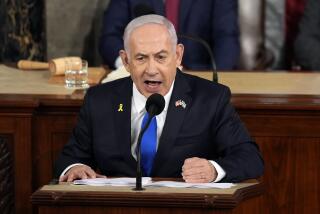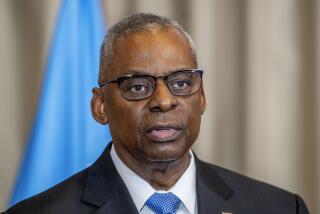Lawmakers Call on Iraq to Shape Up
- Share via
BAGHDAD — A bipartisan congressional delegation that included Sen. Barack Obama (D-Ill.) had a blunt assessment Saturday for Iraq’s political leaders: Shape up, or America will ship out.
The continued U.S. commitment to Iraq is becoming a tougher sell back home, said the four lawmakers, and unless Iraqis start showing signs of progress by creating a broad-based government and security forces that incorporate all of Iraq’s ethnic and sectarian groups, Americans will lose patience, they said.
“It’s going to be hard to convince American taxpayers to pour water into a leaky bucket,” said Obama, a member of the Senate Foreign Relations Committee. He spoke briefly with a small group of reporters inside former Iraqi President Saddam Hussein’s Republican Palace, which is now used as an annex for the U.S. Embassy.
Obama, with Sen. Christopher S. Bond (R-Mo.), Sen. Evan Bayh (D-Ind.) and Rep. Harold E. Ford Jr. (D-Tenn.), arrived in Iraq on Saturday for a whirlwind trip that included meetings with American intelligence and reconstruction specialists and Iraqi election officials in the capital’s U.S.-protected Green Zone. They plan visits today with troops in outlying provinces.
Although the lawmakers said their constituents were proud of America’s accomplishments in Iraq, they were loath to commit further U.S. money and troops if the Iraqi government elected last month did not include all the country’s ethnic and political factions.
“We are willing to continue to help them as long as they are willing to move forward toward a national unity government,” said Bond, known as a backer of the U.S. military. “We are not here to participate in something that is dominated by one particular party or one particular sect.”
To date, Congress has approved more than $300 billion for the wars in Iraq and Afghanistan, according to the Congressional Research Service. And lawmakers say the Pentagon is drafting a request for as much as $100 billion more.
With 2006 midterm elections on the horizon and American opinion polls showing wavering enthusiasm for involvement in Iraq, pressure has been building on members of Congress and President Bush to demonstrate progress or to craft an exit plan.
Bayh, who is eyeing a 2008 White House bid, outlined half a dozen milestones that he and his colleagues said they would like to see Iraqis achieve over the next six months to be able to convince American voters that the continued commitment to Iraq was worthwhile.
Among the goals were the quick formation of a government, signs of economic progress, acceptance of the political process by Sunni Arabs and the formation of a civil service and security forces that reflect Iraq’s various ethnic and sectarian groups.
Iraqis must ask themselves some tough questions, Bayh said: “Do the Iraqis want to live together in one country? Are they willing to make the tough political compromises necessary to bring that about? If they don’t, in spite of all our help [the conflict] will not end.”
It remains unclear how much sway U.S. officials will have over the new Iraqi government, which appears set to be dominated Shiite Islamists with ties to Iran and by autonomy-minded Kurds.
After a week marked by major insurgent attacks, little violence was reported Saturday. Police special forces on patrol in eastern Baghdad were hit by a car bomb, injuring four commandos and five civilians.
More to Read
Sign up for Essential California
The most important California stories and recommendations in your inbox every morning.
You may occasionally receive promotional content from the Los Angeles Times.












